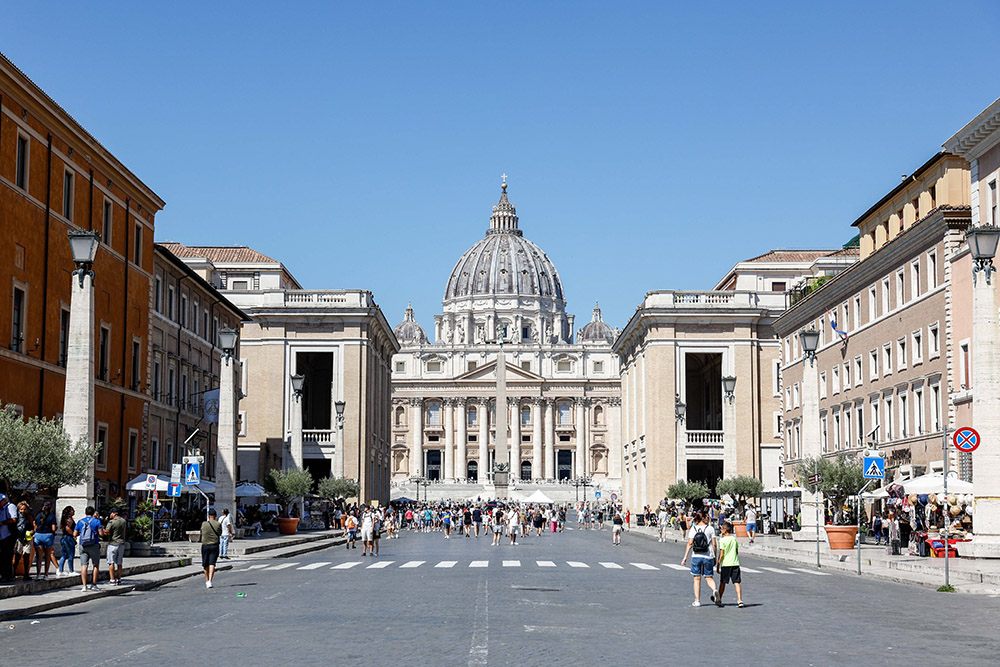Pilgrims and tourists walk along the Via della Conciliazione toward St. Peter’s Square and St. Peter’s Basilica Aug. 15, 2023. (Photo: CNS/Lola Gomez)
NEW YORK – In the hours that followed release of a Vatican note outlining the pastoral grounds for same-sex blessings, reactions among American Catholics seemed to run the gamut from styling it as a major step forward to insisting on hitting the brakes, on the grounds that not much has really changed.
Reaction to the note from LGBTQ Catholics and advocates was largely enthusiastic, hailing the new document, Fiducia supplicans, as a milestone. Commentary from some theologians, meanwhile, cautioned that it’s misleading to frame the declaration as a monumental shift in either teaching or practice.
A statement from the United States Conference of Catholic Bishops appeared to fall into that second category.
“The declaration issued today by the Vatican’s Dicastery for the Doctrine of the Faith (DDF) articulated a distinction between liturgical (sacramental) blessings, and pastoral blessings, which may be given to persons who desire God’s loving grace in their lives,” the USCCB said in a Dec. 18 statement, through spokesperson Chieko Noguchi.
“The Church’s teaching on marriage has not changed, and this declaration affirms that, while also making an effort to accompany people through the imparting of pastoral blessings because each of us needs God’s healing love and mercy in our lives,” the statement said.
The new declaration was published Dec. 18 by the prefect of the Vatican’s Dicastery for the Doctrine of the Faith, Argentine Cardinal Víctor Manuel Fernández, and the dicastery’s secretary, Italian Father Armando Matteo.
In short, the declaration upholds the sacrament of marriage as between a man and a woman, and therefore specifies that the Church cannot impart blessings on same-sex unions in a liturgical sense. What’s new is that the DDF made a distinction between liturgical blessings and a simple pastoral blessing, and held that pastors can, when asked, provide a simple blessing to couples in irregular situations and to same-sex couples.
“It’s kind of an example of Pope Francis’s ministry as a whole, trying to combine doctrinal fidelity, in terms of Catholic teaching on marriage and sexuality, but at the same time pastoral sensitivity and the emphasis on accompaniment,” John Grabowski, a Catholic University of America professor of moral theology/ethics, told Crux.
“It’s trying to blend the Church’s teaching with an inclusive pastoral approach while avoiding scandal, confusion, etc., which has been kind of the characteristic of Pope Francis’s approach,” Grabowski said. “His aim is not to change the teaching, but to change the tone in which the Church teaches.”
Grabowski said the text sends an “encouraging message” to LGBTQ Catholics. However, he cautioned that the declaration could also lead to confusion if people take it to mean that “the pope is saying the Church can bless same sex couples, and just end of story.”
That possibility for confusion led another theologian, Ulrich Lehner, to call the declaration “the most unfortunate public announcement in decades.”
“Its imprecise language invites misunderstanding and will sow confusion. Moreover, some bishops will use it as a pretext to do what the document explicitly forbids, especially since the Vatican has not stopped them before,” said Lehner, the University of Notre Dame William K. Warren Professor of Theology.
“It is – and I hate to say it – an invitation to schism,” Lehner added in a statement.
Both Lehner and Grabowski connected the declaration to the situation in Germany, where priests have blessed same-sex couples. Grabowski predicted the declaration will be read as a “green light” for what the Germans are doing already, which, he said, would amount to misreading the document.
In a conversation with Crux, Boston College professor Cathleen Kaveny said the most important part of the declaration isn’t actually the point about same-sex relationships. Rather, it’s the reframing of what a blessing is.
Kaveny explained that in previous documents blessings were seen as sort of endorsements – “putting the good housekeeping seal of approval on something so therefore, if we don’t approve of the situation like a same-sex relationship, we can’t bless it,” she said.
“I think what the document is fundamentally saying is that blessings are not a good housekeeping seal of approval for every aspect of our behavior,” said Kaveny, the Boston College Darald and Juliet Libby Millennium Professor, specializing in the relationship between law, religion and morality.
“[Blessings] are a way of channeling God’s grace both upward – thanking God for what he’s given us, those are ascending blessings – and calling upon God’s blessing of us in our own situation, which the document called descending blessings,” she explained.
The declaration outlines situations in which blessings are appropriate for same-sex couples or those in irregular unions. It states that these blessings should never be given “in concurrence with the ceremonies of a civil union, and not even in connection with them.”
The declaration continues that the blessing cannot be performed with any clothing, gestures, or words that are proper to a wedding. Conversely, the declaration states that the blessings can be provided in informal situations such as a visit to a shrine, a meeting with a priest, a prayer group, or during a pilgrimage.
Still, despite its narrow scope, LGBTQ Catholics view the declaration as a significant step forward.
Francis DeBernardo, executive director of the Catholic advocacy organization New Ways Ministry, said in a statement that “it cannot be overstated how significant the Vatican’s new declaration is,” for the fact that it “expands the ways that LGTBQ+ Catholics can know God’s love.”
Father James Martin, a leading minister to and advocate for LGTBQ Catholics, in a series of statements called the declaration “a major step forward in the church’s ministry to LGBTQ people and recognizes the deep desire in many Catholic same-sex couples for God’s presence in their loving relationships.”
“Along with many priests, I will now be delighted to bless my friends’ same-sex unions,” Martin said.

